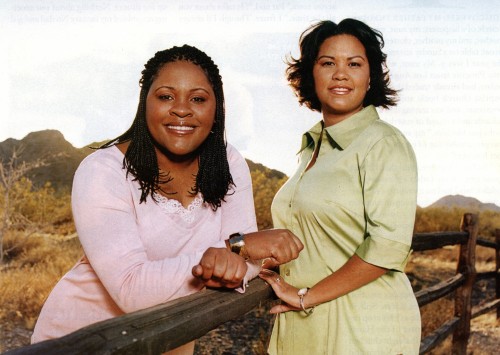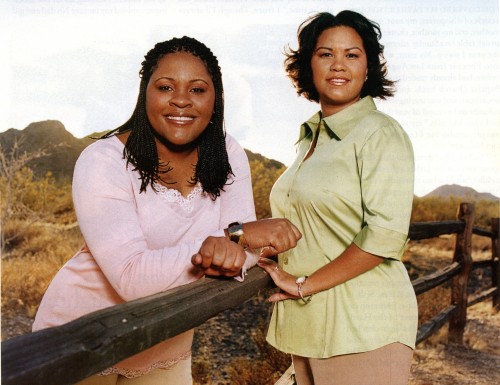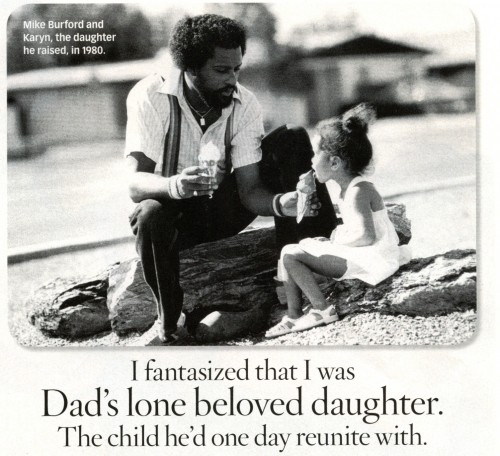My Family on the Other Side of Town
She’d never met her biological father. Then one day Michelle Burford worked up the nerve to call him. The result: conversation (stilted), understanding (finally) and an amazing sisterly connection she came this close to missing.
BY MICHELLE BURFORD | O, THE OPRAH MAGAZINE | JUNE 2006

When I was 17, I met my sister Karyn (above right) for the first time. She still lives in our hometown of Phoenix.
I DISCOVERED MY FATHER THROUGH a circle of whisperers: my aunt, my grandmother, and my mother, clustered around an oak table on a Sunday afternoon when I was 9. My aunt, who’d flown into Phoenix from Los Angeles the day before, had already traded that morning’s Baptist church heels and pearls for a housecoat, and was tearing into a plate of collards and a round of scuttlebutt. “She looks just like him,” my aunt said when I was presumably out of earshot. “Has she met him yet?”
I hadn’t. I had been told that I’d once spent time in my father’s presence as a toddler, but I had no memory of his face. After years of eavesdropping on a mother who was understandably reluctant to dredge up difficult memories and wanted to guard me from pain, I knew that he’d remarried and moved across town to Glendale. Once, I heard a family member refer to him as “the spittin’ image of that gospel singer Larnelle Harris.” When I was 7, I had overheard another family member mention my dad’s other daughter, Karyn. Still, in the hours after midnight as I lay atop my bunk examining the cover of the Harris album with a tiny flashlight clutched in my hand, I forgot about Karyn and fantasized that I was Dad’s only girl. His lone beloved daughter. The child he’d one day reunite with.
The Phone Call
During the summer I turned 17, my daydream took flight. “Are you Mike Burford’s daughter?” the salon stylist asked as she eyed the ticket that bore my full name. I was terrified. My photo had just made The Arizona Republic because I’d been named Phoenix Young Woman of the Year, in recognition of stellar grades and community service. The next morning on TV, I was to be honored by the mayor.
To tame my frizzies, Mom had dropped me at the $9-a-head beauty school for an assembly-line hairdo. “Uh, yes,” I finally stammered to the stylist once the shock of hearing my father’s name aloud dissipated. “I am Michelle Burford—Mike’s daughter.”
This was the last piece of truth I uttered that afternoon. As Pat the beautician snipped my ends and gushed about my father, I pretended I’d always known him, only because I longed to gather any detail I could about this man she called a friend. “I cut your dad’s hair at my other salon across town,” Pat said. “He talks about you all the time.” I froze. Though I’d always imagined my father had been following my life from afar, this revelation somehow frightened me.
Which is probably why I waited another three summers to call him. On break during my junior year of college, I flipped through the Phoenix Yellow Pages in search of the salon where I’d met Pat. “I’ve never known my father,” I confessed once I tracked her down. “I want to.” A day later, Pat gave me his number. The first time I heard his voice on the answering machine, I snapped down the receiver and wept. “This is Mike, JoAnn, Karyn, and Michael” is how I remembered my father had another family: a wife, a daughter, and a son. The next afternoon, I called twice more before my father picked up.
“This is Michelle,” I said with zero pause between each word. “Michelle Burford.” Silence.
“I know,” my father said finally. “Pat told me you called her.”
Two days later, he arrived to pick me up for dinner. Nothing about our meeting resembled my fantasy. No dad and girl running toward each other across a field of tulips. No lingering hug and irrepressible tears. No hours spent retracing 20 missed years. Just one incredibly nervous girl and one play-it-cool man trying to make the moment less awkward.
Seconds after I opened the front door, I mumbled hello before lowering my gaze to my sandals, then grabbed my purse and practically knocked him over as I hurried toward the passenger seat of his car. On our way to the restaurant, we rode along to the sound of jazz. “How are you?” he asked in an attempt to melt the iceberg I’d placed between us. “Good,” I shot back, looking away. I wanted to say more. I wanted to know: Where have you been all my life? Yet all I could do was set a new personal record in nail chewing.
Thirty minutes later at a restaurant in Glendale, I sat across from my dad; across from his wife, JoAnn, an elegantly dressed Mexican woman with irreproachable manners; across from my then-15-year-old half sister, who shared my last name and my father and, it seemed, little else. As the next two hours snaked along, I could not have said more than a few complete sentences to this row of Burfords I was stunned to be sitting near.
Karyn was as gracious and refined as her mother and attempted polite conversation across the chasm that separated our worlds. For two sisters who grew up in the same city, our realities couldn’t have been more different. Karyn attended one of Arizona’s premiere private high schools; though my mother and stepdad encouraged me to excel, I went to a school more renowned for its ills than for its academic rigor. Karyn spent her childhood in the “other” box—a racial hybrid in a sea of white faces, a girl refuting a question she still despises: “What are you, exactly?” Across town, I lived in the city’s largest enclave of blacks.
Mostly, it was my father who talked, and I—who had two decades of questions lodged in my throat—cannot remember a single word he said. I pushed risotto from one rim of the plate to the other. Each time my father looked away, I stole a glance at the man whose face and comportment were so eerily like my own. My aunt was right: I was undeniably his daughter.
At summer’s end, before I returned to college in Los Angeles, my father schlepped from Glendale to Phoenix for our second visit. The first time he’d arrived to pick me up, my mother had chosen to let me meet him alone. This time she was home. And this time when I dashed for the door, she got there first. “Hello, Mike,” she said as I appeared around a corner. A second later, I stood in the triangle I’d been born into: My mother, my father, and me, staring at one another in silence. For the only time in my memory, I looked at both the man and the woman who’d given me life. I will never forget that moment.
The Reckoning
In the years that followed, my father called often. And each time, I found myself dreading the five-minute “How’s the weather?” conversation because it felt meaningless, a way to elude the pain of 20 years lost. For months at a time, I avoided him. I seldom returned his calls or acknowledged his birthday cards because I knew our connection was built on a shaky foundation of unspeakables, but I didn’t have the courage to march the truth out onto the scaffold and stand there with it.
I can’t tell you where my chutzpah came from, but one afternoon when I spotted my father’s name on caller ID, I gathered the nerve to take our connection deeper. “I can’t remember the last time it was so hot here,” Dad began. “Why didn’t you ever call me?” I interrupted. Long pause. Followed by a sentence that changed the direction of our friendship: “I should’ve called you, Michelle. There’s no excuse.” He went on to say that he hadn’t wanted to barge into the new family my mother had made for me. Any other explanation—a lie like “I loved you but I just couldn’t find you”—would have made me put down the receiver forever. I didn’t always like my father’s answers, but that day I promised myself that I’d hear him. Not because he wanted me to listen, but because I needed to face the history I was born into.
Ten years after I found my father, I sat across from him again—this time from chair to hospital bed, palm to palm. That night and in the year before colon cancer claimed his life, he and I finally made it around to the biggies—like why he and my mother split. Like how his proudest moments and his biggest humiliations had changed him. I cried. I forgave. I asked to be forgiven for all the times I’d shut him out in the years after our meeting. I left his room that night knowing I might never see him alive again. I did not.
The Connection
In the space left by my father’s death, I discovered Karyn. For a decade, we had been acquaintances, delivering the double-cheek kiss and the two-minute catch-up every few months. But as with so many people I’ve dismissed with a glance—certain that too much makes us different to bother nurturing similarity—I never really saw her. Instead, I pegged her as a wavy-haired, privileged girl who had zilch to share with me. I was wrong.
“You sit like Dad,” Karyn said when she visited me for the first time in Harlem, about a year and a half after our father’s death. We’d strolled through Central Park for two hours, and we were taking a break on a wooden bench. There we posed our stored-up questions. (She: “What does your mom look like?” Me: “What was it like growing up with Dad?”) We exchanged the file of details that gal pals often keep on each other (hideous hairstyles, first kisses, best lipsticks, jerk boyfriends). I sat. I heard. I revealed. And later that evening, I cried because I’d nearly allowed my judgments to eclipse a connection of such magnificence.
I’ve set out looking for my father twice: First on the cover of a gospel album, next in the praises of a chatty beautician. On a park bench in Harlem one day last fall, I glimpsed him through a gift he gave me—an extraordinary woman he left behind.
Need a great essay on a tight timeline? E-mail Michelle@MichelleBurford.com

